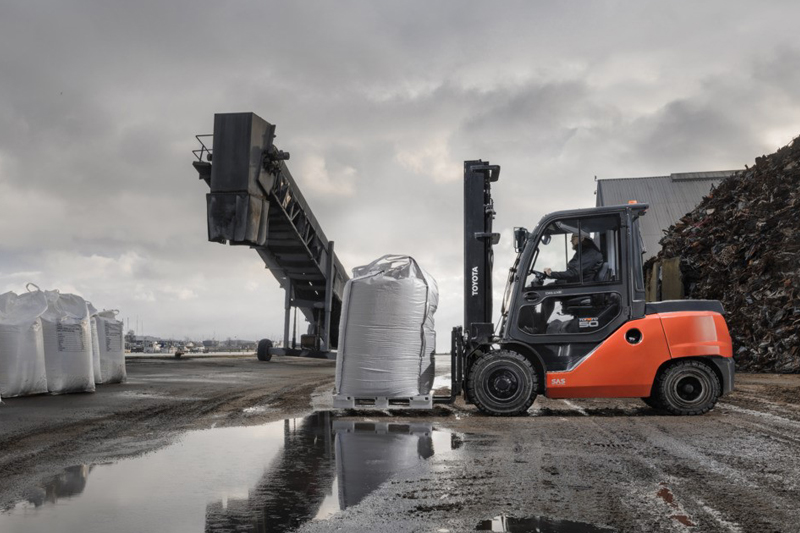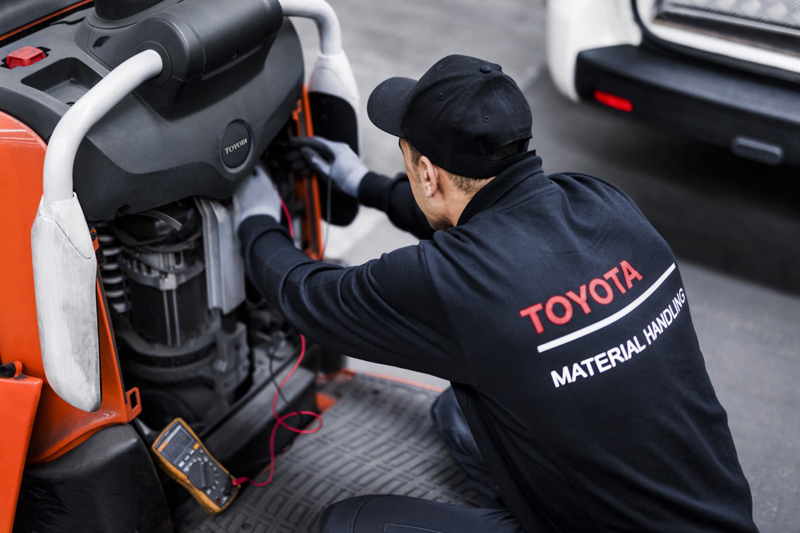
Sam Gray, Toyota Material Handling UK’s Sales Training and Product Development Manager, discusses HVO fuel — a new alternative to fossil diesel that is said to cut the net CO2 emissions of IC engine-powered forklifts by as much as 90%.
With the growing drive to tackle the root causes of climate change, companies of all sizes now demand the most sustainable energy solutions for their forklift fleets. HVO — the latest fuel to come on to the market — is said to allow IC engine-powered forklift truck users to cut their net CO2 emissions by as much as 90%, reduce nitrogen oxide (NOx), and cut both particulate matter (PM) and carbon monoxide (CO) emissions.
Part of the paraffinic family of fuels, HVO — hydrotreated vegetable oil — is clean and safe, and meets all relevant fuel standards and EN 15940:2016 specifications. A low carbon, low emission, fossil-free, environmentally-friendly and sustainable alternative to conventional fossil diesel, it is unsurprising that many experts consider that HVO has a vital role to play in helping the UK achieve its 2050 net zero target for greenhouse gas emissions.
Endorsed by a wide range of original engine manufacturers, HVO is synthetically produced using a complex refinery process that removes oxygen from vegetable oil and waste animal fat molecules and creates hydrocarbons very similar to regular diesel. But it is important to understand that HVO is not biodiesel: it is fundamentally different and, as such, doesn’t suffer from any of the negative issues sometimes associated with biodiesel.
A further plus-point is the fact that, because HVO is 100% interchangeable with conventional fossil diesel, it can be blended at any ratio so forklift users can simply ‘top-up and go’ without any need to drain or clean fuel tanks.
Impurities are removed from the fuel during the production cycle leaving a consistent, quality product that significantly reduces harmful emissions from diesel engines. To add to HVO’s green credentials, only completely renewable materials are used in the production process and the crops from which the fuel is made are grown and harvested without damaging the environment or the natural ecosystem.
Already used to power a wide range of modern vehicles as well as construction machinery and industrial power systems, HVO is considered an eco-upgrade on diesel because it is a fuel that not only reduces emissions and burns more cleanly, but is also safer to handle than mineral diesel while reduced particulate production during the combustion process reduces the ageing of engine oils and improves local air quality.
One of the biggest advantages of HVO is the fact that truck users do not need to modify their diesel-powered forklifts to use it. For example, nearly all Toyota industrial IC engines will run perfectly with HVO fuel and, importantly, no changes are required to the daily running or servicing regimes of Toyota diesel engines if the switch to HVO is made.
A further plus-point is the fact that, because HVO is 100% interchangeable with conventional fossil diesel, it can be blended at any ratio so forklift users can simply ‘top-up and go’ without any need to drain or clean fuel tanks. This ability to be interchanged with an absolute minimum of fuss has been recognised and most major engine manufacturers’ warranties will support an instant switch from diesel to HVO.
Possibly the only downside is that when it comes to price HVO is slightly more expensive than traditional diesel. However, with the high-profile of climate change and environmental concerns always close to the top of the business agenda, many lift truck users believe that the relatively modest extra cost is a price worth paying to be seen to be doing the right thing for the planet.
A version of this article appeared in the January edition of PBM. Click or tap the link to read to view the full digital issue via our website.
At a time when companies are focused on keeping business costs to a minimum, Toyota Material Handling UK is urging merchants to maintain a strict maintenance and servicing regime.
Andy Pritchard, the company’s Service Sales Manager, said: “A regular servicing and maintenance regime is the best way of preventing significant truck downtime — and all the cost and disruption to a business that can entail. And, with repair costs for serious truck damage rising, a commitment to forklift maintenance and servicing is becoming more important than ever.
“Regardless of whether your business operates a single pallet truck or a large fleet of varied materials handling equipment, when sourcing forklift trucks it is important to deal with an organisation that has the infrastructure in place to guarantee the highest levels of lift truck service and maintenance support.”
Toyota says that it offers a range of after-sales care and support packages to suit the business needs of companies of all sizes operating in all industry sectors. For example, the ‘full service’ package involves a comprehensive parts and labour plan that covers preventative maintenance, breakdowns and parts used in service and breakdown repairs.










